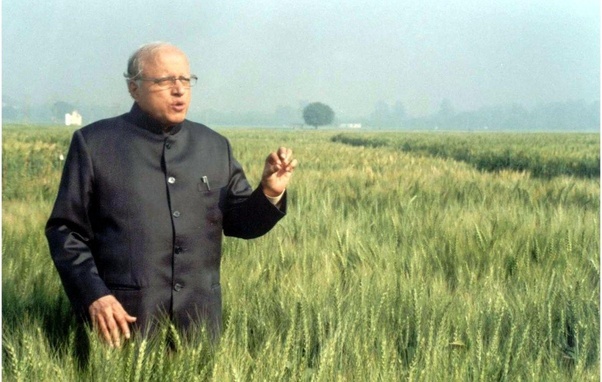
Commission:
- The government of India constituted the National Commission on Farmers (NCF) on November 18, 2004.
- The NCF was chaired by Professor M.S. Swaminathan.
- It submitted five reports to the government.
- The reports had suggestions for “faster and more inclusive growth” for farmers as was envisaged in the Planning Commission’s Approach to 11th Five Year Plan.
- The fifth report was the most crucial as it contained suggestions for inclusive growth of farmers and agriculture sector.
- NCF’s Swaminathan Commission Report aimed at working out a system for food and nutrition security, sustainability in the farming system, enhancing quality and cost competitiveness of farm commodities and also to recommend measures for credit and other marketing related steps.
- Dr Swaminathan had requested the government to implement the recommendations given in the report so that it could provide minimum support price for grains, safeguard the interest of small farmers and addressing the issue of increasing risk overtaking agriculture as a profession.
Observations
- The Commission observed that farmers needed to have an assured access to and control over rightful basic resources. These basic resources include land, water, bioresources, credit and insurance, technology and knowledge management, and markets.
- It observed that agriculture must be implemented in the concurrent list from the state list — hence putting it as a matter of concern for both the Union and the states.
Recommendations
- One of the key reforms was land reforms. It was aimed to address the issue of access to and for both crops and livestock. The commission said that the inequality in landholdings in shown starkly in land ownership. It said that in 1991-92, the share of the bottom 50 per cent of the rural households in the country’s total land ownership was only three per cent. The top 10 per cent owned as much as 54 per cent.
- Land Reforms: Distribution of ceiling-surplus and waste lands; prevention of diversion of prime agricultural land and forest to corporate sector for non-agricultural use; to ensure grazing rights are provided and seasonal access is allowed in forests to tribals and pastoralists. It recommended access to common property resources. One main case was establishing a National Land Use Advisory Service. The purpose of this service would be to connect land usage decisions with ecological meteorological and marketing factors.
- Irrigation Reforms: It recommended framing a set of reforms to provide farmers with “sustained and equitable” access to water for irrigation. Ensuring boost in water supply by rainwater harvesting, water level recharging by mandatory aquifers; Million Wells Recharge programme to be initiated targeted at private wells. To target increase in investment in irrigation sector under 11th five year plan.
- Productivity Growth: NCF said that with the objective of achieving higher productivity growth, it recommended “Substantial increase in public investment in agriculture-related infrastructure particularly in irrigation, drainage, land development, water conservation, research development and road connectivity etc.” It also recommended a national network of advanced soil testing labs with an aim to test areas for apt micronutrient levels.
- Credit and Insurance: Expand outreach of formal credit system; reduce crop loan interest rates to 4%; provide moratorium on debt recovery; agricultural risk fund; kisan credit cards for women farmers; integrated credit-cum-crop-livestock human health insurance package; crop insurance across country for all crops with reduced premiums; sustainable livelihoods for the poor, investment in human development; institutional development services etc
- Food Security: The commission recommended Implementation of a universal public distribution system; reorganising delivery of nutrition support programmes on a life-cycle basis with panchayat participation and that of local bodies; elimination of micronutrient deficiency induced hunger and food cum fortification; community food and water banks to be operated by women self-help groups; help small and marginal farmers; formulate national food guarantee act with features as food for work and employment guarantee programmes.
- Prevention of Farmer Suicides: Providing affordable health insurance at primary healthcare centres in villages; national rural health mission to be extended to suicide hotspots on priority basis; state level farmers’ commissions with representatives of farmers, restructuring of microfinance policies that may serve as a sort of livelihood finance; covering all crops by crop insurance; village to be the assessor and not the block, social security net that gives old age support with health insurance and aquifer recharge and rain water conservation; plans for decentralised water usage etc.